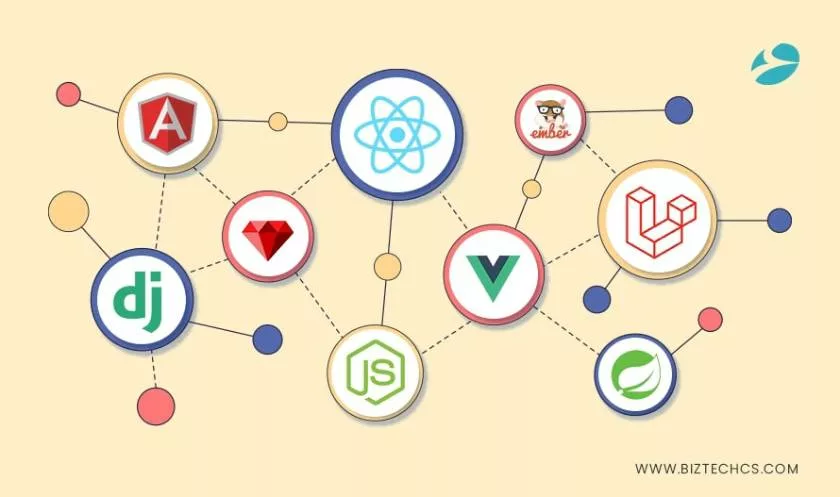5531
9 Best Web Development Frameworks for 2023: List Revealed
17 Oct, 2022
7 min read
5531
17 Oct, 2022
7 min read
Table of content:

Are you looking for the best web development frameworks of 2023 for your project? Well, you have embarked on a journey that demands careful decisions. And may result in disastrous outcomes, knowingly or unknowingly.
One right decision can help you create futuristic web experiences for your audience. Likewise, choosing the wrong technology might lead you to unfavorable situations.
Needless to say, you are working up your brains to find the best web development frameworks for your project. Lucky for you, this list includes the top web development frameworks for you to choose from.
To further help you decide, I have explained when and where these technologies fit smoothly. Whether you are rebuilding your site’s backend, redesigning the front end, or want to develop a full-fledged website, you may need to choose one or more technologies.
So, are you aware of what your project demands? If not, let’s help you with that first!
A web development framework is a software that supports the development of websites, web applications, web APIs, and other web resources. It makes developing and managing codes much easier so that you can develop feature-rich and secure apps in less time.
These frameworks ensure developers don’t have to build everything from the ground up and reuse the already written codes or components to save time and money. There are many such features and advantages that distinguish one web framework from another.
Depending on its architecture pattern, programming languages used, code reusability, and third-party plugin/library availability, you may find one framework more suitable than the other.
Before I mention the list of the best framework for websites, let’s help you understand the difference between a website’s front end and back end. Let’s check!
| Front-end | Backend | |
|---|---|---|
| Description | It is the front interface visible to the end users where a business shows its products and services. | This is the backend or admin interface accessible by the business unit or their authorized employees. |
| Programming languages used | HTML, CSS, Javascript | Python, Java, Ruby, PHP |
| Alternatively known as | Client-side development | Server-side development |
| Responsibilities of a developer | UI/UX designing, building reusable components, SEO optimization, improving UI performance, and scalability. | Site architecture designing, URL routing, database management, server handling, security maintenance, etc. |
Now that you know web front end vs backend, let’s help you analyze your requirements better.
Do you already have a website and want to update its front end only? Then, you don’t have to go for full-stack development. You can hire front-end developers and redesign your website’s front end.
Likewise, if you are pleased with the performance and look of your site’s front end, but find working with the backend complex, backend development will be required. You can ask developers to build a rather simple and easy-to-manage backend for you.
However, if you are developing and launching your first website from the ground up, you would need to develop both front-end and back-end.
Besides these, you also have to consider these things to choose the most suitable framework for websites:
Read Here: Top 8 Programming Languages Used by Amazon
For Backend:
Laravel was first released in 2011 by its developer Taylor Otwell. It is a PHP-based open-source framework for developing robust backend web applications.
The platform supports MVC (Model, view, controller) architecture to simplify the coding procedure. It comes with several packages and API support to further extend its usability.
The latest Laravel 9.30 update further adds new features to the already feature-rich platform in addition to bug fixes.
Examples – Invoice Ninja, Barchart, Alison, Alphacoders.com, Laracasts, MyRank, CheckPeople, Laravel.io, etc.
Advantages –
Besides, when you hire Laravel developers who are skilled and seasoned, you can create seamless web solutions with improved UX.
Disadvantages –
Best use for –
Since Laravel is built to be scalable, large projects and websites can also be developed using it. Besides scalability, it is also capable of developing secure web solutions. Thus, Laravel is also said to be suitable for eCommerce development.
Alternatively known as the de facto standard for Node.js, it is one of the most renowned backend website frameworks. The Node.js API is highly flexible and can be used for developing web applications of any size.
With in-built features like server-side scripting, routing, third-party integrations, and templating, building feature-rich applications will be easier. As long as you hire NodeJS developers who are well-versed in the intricacies of the Express framework, you will be able to build stellar apps.
Examples: Twitter, Stack, Kevin, Intuit, Accenture, TrustPilot, IBM, eBay, Netflix, Uber, etc.
Advantages:
Disadvantages:
Best use for:
Express can be used for developing hybrid, single-page, and multipage applications.
It was released in 2004 and is one of the oldest backend web frameworks available today. Following the MVC architecture, it is considered one of the best web frameworks because of multiple reasons – quick development, extensive tools & library support, and consistency.
Examples: Github, Airbnb, Hulu, and Groupon.
Advantages:
Disadvantages:
Best use for:
Complex web applications, eCommerce stores, stock exchange platforms, information portals, social networking sites, etc.
This Python-based, open-source framework is based on the MVT (Model, view, template) architecture. It is preferred for both front-end and back-end development of web apps due to features like code reusability, authentication, and in-built validation.
Hire Django developers to build a sturdy backend if you have a large and complex project in hand.
Examples: Dropbox, Instagram, Disqus, Spotify, Eventbrite, BitBucket, YouTube, etc.
Advantages:
Disadvantages:
Best use for:
Developing a multi-vendor website like Alibaba that can scale, web apps for startups, database-driven websites, etc.
Spring web framework uses one of the most popular programming languages for web development, i.e., Java. Any Java-based application can easily utilize its core features. You can also extend its capabilities to build robust web applications.
Examples: TicketMaster, Wix, BillGuard.
Advantages:
Disadvantages:
Best use for:
The Spring framework can be best utilized as application support for Java web apps. It is used for building enterprise java applications mostly.
For Frontend:
It is a Javascript library used for developing intuitive and engaging user interfaces with the help of UI components. The open-source library is developed and managed by Meta and the community.
React integrates seamlessly with other libraries to support operations like state management, routing, API integration, etc. Hire ReactJS developers to leverage the best features and get added advantages if you have to work with React Native.
However, you should note there is a difference between React and React Native as the latter is used for mobile app development only.
Examples: Dropbox, Github, Yahoo, WhatsApp, Instagram, CodeAcademy, BBC, and Facebook.
Advantages:
Disadvantages:
Best use for:
The library, often used in the context of a framework, is best suited for developing engaging front-end UI. For instance, if you want to build a beauty product website, you can trust React for front-end development.
When it was first released in 2009, Angular used Javascript for coding. However, the framework was transformed in 2016 to use Typescript as its programming language.
It follows MVC architecture to build dynamic web applications and contains directives, components, libraries, controllers, etc. Backed by Google, it also has a huge community to help your project.
Examples: Upwork, IBM, Freelancer, PayPal, Forbes, Weather, Deutsche Bank, and The Guardian.
Advantages:
Disadvantages:
Best use for:
Hire Angular JS developers and leverage these benefits for building impressive single-page applications, dynamic web apps, and enterprise business apps.
The framework is developed and maintained by Evan You and is a JS-based open-source framework. It follows MVVM (model, view, view model) architecture for development. With an easy learning curve and the availability of several tools, it is one of the best web frameworks for the front end.
Examples – Netflix, GitLab, VICE Video, Grammarly, Chess.com.
Advantages –
Disadvantages –
Best use for:
You can hire Vue.js developers to build single-page applications and attractive web interfaces. However, it is mostly used for developing small projects than large ones.
This Javascript-based framework is suitable for developing feature-rich SPAs. With its MVVM architecture and best JS practices, developing an engaging front-end becomes much easier.
Examples: Netflix, Google, Microsoft, etc.
Advantages:
Disadvantages:
Best use for:
Feature-rich web applications for any vertical.
Mentioned above are some of the best frameworks for web development that are popularly used today. You can choose any of these or a combination of them to develop your entire website or web app.
However, be careful about the size, industry, and complexity of your project before deciding. If you are still puzzled or need further assistance with your project, our developers can help you. BiztechCS is a renowned web development company and has years of experience building feature-rich and secure web applications.
There are several technologies to ease your development experience, and this list is all about that. However, your understanding of these technologies and your custom project requirements will assist you in choosing the best website framework. Once you have made a sound decision, get the necessary technical help by hiring dedicated web developers for your business.

.NET
197
By Devik Gondaliya
15 Jul, 2025

.NET
190
By Devik Gondaliya
15 Jul, 2025

Odoo
248
By Biztech
15 Jul, 2025